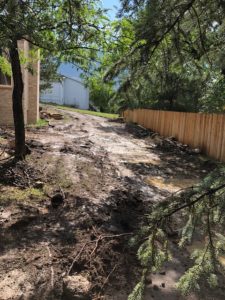Colorado Springs — At a Nov. 28 meeting of the Regional Building Commission (RBC) a long-running dispute between neighbors in the Broadmoor Valley area led to a complaint against Keith Curtis, Floodplain Administrator at the Pikes Peak Regional Building Department (PPRBD).
The three-member RBC is the oversight board for the PPRBD, which is an independent government enterprise set up in 1966 to handle regional building permits and building code inspections.
Frustrated by what they see as an abuse of authority and the lack of a process for dealing with ethics issues, Curtis’ next-door neighbors, Lisa and David Wright presented a complaint about Curtis’ interference with their plans to correct a storm water drainage problem on the yard between their properties.
At the Nov. 28 meeting, the Wrights said their attempt to remove three trees and pare down a soil hump that was causing water to flood into their basement has been obstructed by Curtis for more than two years. “The unethical behavior and actions of this employee [Curtis] regarding our property has been interminable and caused undue hardship and emotional distress,” said Lisa Wright.

The problem is the result of 30 years of tree growth, erosion and soil movement. The trees were dying and were too close to the house according to city wildfire mitigation recommendations and it was when David Wright took down the trees in 2016, which did not require any permit, that Curtis began complaining to the city.
After consultation with the city the Wrights in 2016 obtained site plan approval to regrade the yard that is valid for six years. Due to financial problems they were unable to schedule the earth work until last June. As soon as they started work they say Curtis insisted that they couldn’t do so and began complaining again.
Curtis gave the Wrights several documents that he characterized as his “professional opinion, based on 16 years of career experience with drainage design and citizen dispute resolution.” During this two-year process, Curtis sent many other emails to city staff that included his version of events and his opinions and ideas on the project but never included the Wrights in the distribution.
The Wrights, believing the 2016 site plan and city permission were still valid, ignored his advice.
When they started moving dirt from the hump to restore the grade to its original specifications and install an underground drain early last June, Curtis complained to Colorado Springs Permit Center Administrator Matthew Bingman by email June 12, using his official PPRBD email account and title.
This began an extensive exchange of emails between city staff and Curtis, among city staff and between city staff and the Wrights. But the Wrights were never made aware of Curtis’ ongoing involvement in the internal discussions and proceeded with the work.
Curtis wrote in a July 30 email to Bingman that he submitted an online complaint “per your guidance” claiming the Wrights “had performed grading and vegetation removal without an approved grading and erosion control plan” and that they were “redirecting drainage and erosion on to my property.” Neither of those claims turned out to be true.
On July 31, Curtis sent an email to city Water Resources Engineer Anna Bergmark saying, “I would like to have a chance to review any grading and erosion control plan that is produced.”

Two days into the $18,000 project, on July 31, Frank Helme, city Engineering Supervisor issued a stop-work order to the Wrights, telling them that they had to obtain a professionally-prepared Grading Erosion and Stormwater Quality Control (GECP) plan, which the Wrights say would cost them thousands of dollars in engineering fees. Their first contractor abandoned the project as a result of the stop-work order. This left the Wrights with a torn-up yard they couldn’t finish.
In his email notifying city staff that he had issued the stop-work order, Helme wrote, “I did not see where they had any runoff into the neighbor’s yard or out into the street.”
Curtis emailed Helme on August 1, writing, “It has been my experience that this guy [David Wright] uses a very aggressive dramatic approach to get his way, try not to be swayed by that. I am willing to work with this guy to help him, but he has been unresponsive to my offers.”
The PPRBD does not have city zoning enforcement authority.
On August 6, in response to repeated requests by Curtis to be included in the process, Richard Mulledy, the Water Resources Engineering Division Manager wrote to Curtis, saying, “I feel that it would be inappropriate for you to have a roll (sic) in the approval of any additional plans.”
When the Wrights eventually discovered the extent of Curtis’ undisclosed communications with the city they decided to make a formal complaint, thinking that the city’s Independent Ethics Commission (IEC) would investigate.
But the PPRBD is a government enterprise that doesn’t fall under the city’s IEC. The Wrights discovered that the PPRBD has no formal ethics review system in place. They decided that their only option was to present their complaint during citizen participation at the RBC’s November meeting.
On Nov. 26, two days before the meeting, David Wright sent a lengthy email to Regional Building Official Roger Lovell, who manages the PPRBD. Wright said, “Also attached is the email we received in October 2018 from the City stating that we are not required to complete a GECP. Their decision cites the exact same City Code I quoted to Matthew Bingman over two years ago. However, due to Keith Curtis, the PPRBD has been conducting numerous ethics violations for the sole personal benefit of Keith Curtis at our expense.”
At the meeting, RBC Commissioner Tom Strand said that this was the first he had heard of the issue and admitted that there are some problems with transparency and the process for citizen complaints that should be addressed.
Lovell said that he would take the complaint under advisement as a personnel matter, which means that the outcome will not be public record.
Keith Curtis did not respond to Complete Colorado’s offer for an on-the-record interview or email response to the Wright’s charges.
The stop-work order was lifted and permission to proceed according to the 2016 site plan was granted by Mulledy on Oct. 26, but it was too late in the year to find another contractor and complete the project, which will have to wait until spring.


